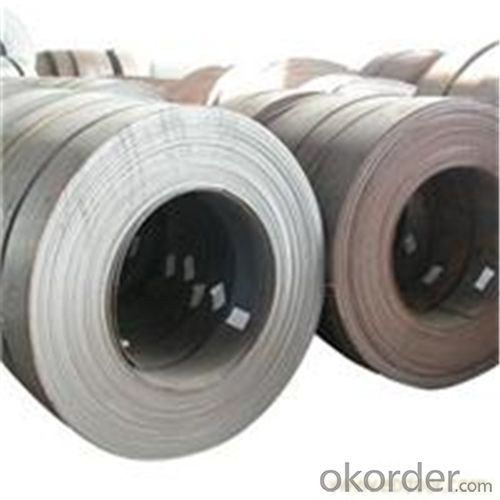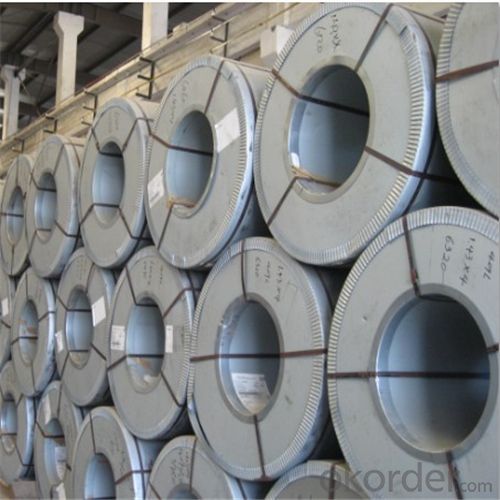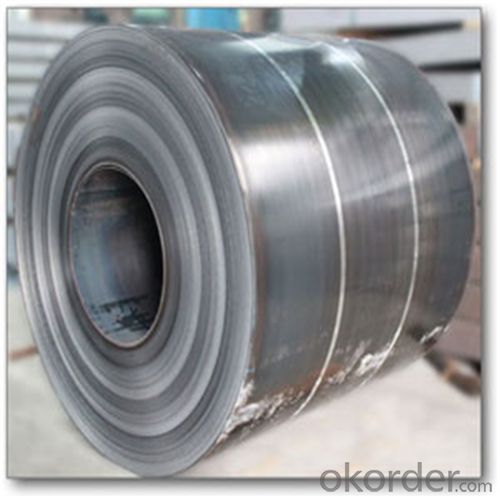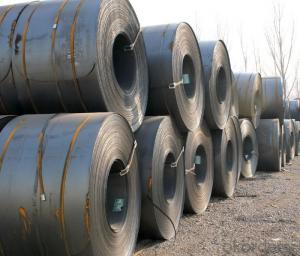Hot Rolled Steel Coil with Attractive Price and High Quality
- Loading Port:
- Tianjin
- Payment Terms:
- TT OR LC
- Min Order Qty:
- 25 m.t.
- Supply Capability:
- 9000 m.t./month
OKorder Service Pledge
OKorder Financial Service
You Might Also Like
Hot Rolled Steel Coil Used for Industry
1.Structure of Hot Rolled Steel Coil Description
Rolled to its final dimensions while it’s hot enough to scale, our hot-rolled steel is an amalgamation of the various qualities of steel. It can be in the form of plates, sheet and coils. Our Hot-Rolled Steel Sheets and Coils are applied to a wide range of uses such as automobile, electrical appliance, machinery manufacturing, container manufacturing, shipbuilding, bridge, pipeline, and receive high acclaim from our customers for its excellent quality.
2.Main Features of the Hot Rolled Steel Coil
•High Purity
•Easy control and operation
•High strength
•Fast melting
•Competitive price
•Best Service
3. Hot Rolled Steel Coil Images



4. Hot Rolled Steel Coil Specification
HOT ROLLED STEEL COIL | |
Thicknenss | 1.5mm-25mm |
Width | 600mm-2000mm |
Sheets length | ---- |
Coil inner diameter | 762mm |
Surface treatement | ---- |
Coil weight | ---- |
5.FAQ of Hot Rolled Steel Coil
We have organized several common questions for our clients,may help you sincerely:
①How about your company?
A world class manufacturer & supplier of castings forging in carbon steel and alloy steel,is one of the large-scale professional investment casting production bases in China,consisting of both casting foundry forging and machining factory. Annually more than 8000 tons Precision casting and forging parts are exported to markets in Europe,America and Japan. OEM casting and forging service available according to customer’s requirements.
②How to guarantee the quality of the products?
We resolutely put an end to unqualified products flowing into the market. At the same time, we will provide necessary follow-up service assurance.
③How long can we receive the product after purchase?
In the purchase of product within three working days, We will arrange the factory delivery as soon as possible. The pecific time of receiving is related to the state and position of customers.Commonly 7 to 10 working days can be served.
- Q:I would like to know if steel is basically a very dense crystal, or if it is a different atomic structure
- Steel is crystalline. In general the bigger the crystals the better.
- Q:How does adding carbon to Iron make it stronger? How does steel look the molecular structure in comparison to Iron? looking for a very scientific answer =]
- Cast Iron' is typically brittle, while 'Maleable Iron' has a small percentage of carbon which allows it to be hammered and formed. Steel is an alloy that consists mostly of iron and has a carbon content between 0.2% and 2.1% by weight, depending on the grade. Carbon is the most common alloying material for iron. Steel is a crystalline structure of iron molecules interspersed with carbon molecules. This is properly known as cementite. The hardness and malleability of steel depends not only on the carbon content, but on how the carbon and iron molecules are arranged to one another. Internal stresses in the steel's crystalline structure will increase or decrease depending on the temperature it is subjected to and the rate at which molten steel is cooled. This 'tempering' can increase the strength of the steel at the expense of brittleness.
- Q:What are the common coil surface finish standards?
- Some common coil surface finish standards include mill finish, brushed finish, polished finish, and coated finish.
- Q:How are steel coils protected against fire and heat?
- To ensure the safety of steel coils, various methods are used to protect them from fire and heat. One effective way is by applying a fire-resistant coating, which acts as a barrier between the steel surface and the heat source. This coating prevents direct contact and reduces the chances of ignition or damage. Aside from coatings, steel coils can also be stored in fire-resistant warehouses or storage facilities. These structures are built with fire-resistant materials like concrete or steel and equipped with fire suppression systems such as sprinklers or fire extinguishers. These measures help contain and suppress any potential fire, effectively limiting its spread and safeguarding the steel coils. Furthermore, facilities that handle steel coils often implement fire safety protocols and procedures. These may include regular fire drills, training programs for employees on fire prevention and response, and the installation of fire safety equipment like fire alarms and fire hoses. These measures ensure that any fire incidents can be quickly detected and addressed, minimizing the risk to the steel coils. Overall, protecting steel coils against fire and heat involves a combination of fire-resistant coatings, proper storage in fire-resistant structures, and the implementation of fire safety protocols. These measures work together to mitigate the risk of fire and heat-related damage, ensuring the integrity and safety of the steel coils.
- Q:Please give me the name of the steel, and the percentage of materials from what It consists, if you can give me five types of steel it will be better so I can decide. Thanks.
- This okorder /
- Q:What are the common transportation defects in steel coils?
- There are several common transportation defects that can occur in steel coils. One of the most common is coil damage caused by improper handling or securing during transportation. This can result in dents, scratches, or even tears in the steel. Another common defect is coil edge damage, which can occur if the coils are not properly protected or if they rub against each other during transit. This can lead to deformation or even breakage of the coil edges. Additionally, coil shifting is another common defect, which happens when the coils are not properly secured or braced, causing them to move and shift during transportation. This can result in misalignment or damage to the coils. Finally, coil corrosion is a common defect that can occur if the coils are exposed to moisture or other corrosive elements during transportation. This can lead to rust and deterioration of the steel. Overall, proper handling, securing, and protection measures are crucial in order to prevent these common transportation defects in steel coils.
- Q:How are steel coils processed for edge conditioning or slitting?
- Steel coils are processed for edge conditioning or slitting through a series of steps. First, the coils are inspected for any defects or irregularities. Then, the coils are uncoiled and leveled to ensure a flat surface. After that, the edges are trimmed or conditioned to remove any imperfections. Finally, the coils are slit into narrower strips according to the desired width.
- Q:What are the different coil coating options available for steel coils?
- There are several different coil coating options available for steel coils, each offering unique benefits and applications. 1. Polyester Coil Coating: Polyester coil coatings are the most commonly used option due to their affordability and versatility. These coatings provide good durability, weather resistance, and color retention, making them suitable for a wide range of indoor and outdoor applications. 2. Polyvinylidene Fluoride (PVDF) Coil Coating: PVDF coil coatings offer excellent resistance to fading, chalking, and chemical exposure. They are highly durable, making them ideal for exterior applications where long-term performance is required. PVDF coatings also have good dirt and stain resistance. 3. Polyurethane Coil Coating: Polyurethane coil coatings provide exceptional adhesion and flexibility. They are often used in applications where the steel coils require excellent resistance to abrasion, impact, and corrosion. Polyurethane coatings also offer good color retention and weather resistance. 4. Silicone Modified Polyester (SMP) Coil Coating: SMP coatings combine the benefits of polyester and silicone coatings. They offer enhanced resistance to chalking, fading, and industrial pollutants. SMP coatings are commonly used in agricultural, industrial, and architectural applications. 5. Polyvinyl Chloride (PVC) Coil Coating: PVC coil coatings provide excellent chemical resistance and are frequently used in applications where resistance to acids, alkalis, and solvents is critical. These coatings also offer good color retention and have a low environmental impact. 6. Epoxy Coil Coating: Epoxy coatings provide exceptional adhesion and corrosion resistance. They are often used in demanding environments such as marine or chemical processing industries. Epoxy coatings can be formulated to meet specific performance requirements, making them highly customizable. 7. Acrylic Coil Coating: Acrylic coatings offer excellent color retention, UV resistance, and gloss retention. They are commonly used in architectural applications where aesthetics are important. Acrylic coatings also provide good resistance to weathering and chemicals. It is important to consider the specific requirements of the application when choosing a coil coating option. Factors such as durability, weather resistance, chemical resistance, adhesion, and color retention should be taken into account to ensure the best performance and longevity of the steel coils.
- Q:How long can steel coils be stored?
- Steel coils can be stored for an extended period of time, typically ranging from a few months to several years, depending on various factors such as the type of steel, storage conditions, and protective measures taken.
- Q:How are steel coils used in the production of pipelines?
- Steel coils are used in the production of pipelines as they are rolled into flat sheets and then formed into the required shape. These coils provide the necessary strength and durability for the pipelines, ensuring they can withstand the high pressure and harsh conditions they will be exposed to.
1. Manufacturer Overview |
|
|---|---|
| Location | |
| Year Established | |
| Annual Output Value | |
| Main Markets | |
| Company Certifications | |
2. Manufacturer Certificates |
|
|---|---|
| a) Certification Name | |
| Range | |
| Reference | |
| Validity Period | |
3. Manufacturer Capability |
|
|---|---|
| a)Trade Capacity | |
| Nearest Port | |
| Export Percentage | |
| No.of Employees in Trade Department | |
| Language Spoken: | |
| b)Factory Information | |
| Factory Size: | |
| No. of Production Lines | |
| Contract Manufacturing | |
| Product Price Range | |
Send your message to us
Hot Rolled Steel Coil with Attractive Price and High Quality
- Loading Port:
- Tianjin
- Payment Terms:
- TT OR LC
- Min Order Qty:
- 25 m.t.
- Supply Capability:
- 9000 m.t./month
OKorder Service Pledge
OKorder Financial Service
Similar products
New products
Hot products
Hot Searches
Related keywords





























